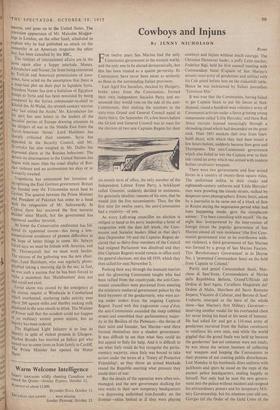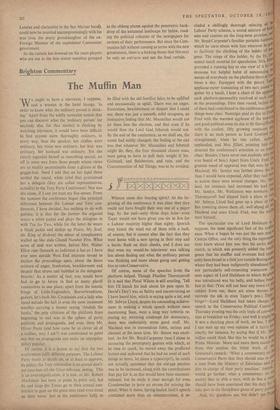Cowboys and Injuns
lt JENNI• NICHOLSON Rome
ri OR twelve years. San Marino had the only Communist government in the western world, and the only one to be elected democratically, but this has been treated as a quaint perversity. Its Communists have never been taken as seriously as those in the surrounding Italian provinces.
Last April five Socialists, shocked by Hungary, broke away from the Communists, formed their own independent Socialist Party and an- nounced they would vote on the side of ,the anti- Communists, thus making the numbers in the sixty-man Grand and General Council equal at thirty-thirty. On September 19, a few hours before the Grand and General Council was to meet for the election of two new Captains Regent for their six-month term of office, the only member of the Independent Labour Front Party, a bricklayer called Giannini, suddenly decided to announce, for genuinely idealistic reasons of his own, that he would join the five successionists. Thus, for the first time for twelve years, the anti-Communists had a majority—of one.
As every Left-wing councillor on election is obliged to hand to his party leadership a letter of resignation with the date left blank, the Com- munist and Socialist leaders filled in that day's date (September 19) and the Captains Regent de- clared that as thirty-four members of the Council had resigned Parliament was dissolved and they. (the Captains Regent) would remain in office until the general elections, not due till 1959, which they then called for next November 3.
Pushing their way through the innocent tourists and the glowering Communist toughs who had been rallied from the countryside, the anti-Com- munist councillors were prevented from entering the miniature mediaeval government palace by the fixed bayonets of the gendarmerie, who were act- ing under orders from the reigning Captains Regent. Faced with this tragi-comic coup d'etat, the anti-Communists ascended the steep cobbled streets and assembled their parliamentary major- ity in the Basilica of the Plebeians—the shrine of their saint and founder, San 'Marino—and there formed themselves into a shadow government. It was difficult to see then what they could do but appeal to Italy for help, And it is difficult to see what Italy could do but recognise the parlia- mentary majority, since Italy was bound to take action under the terms of a 'Treaty of Protective Friendship'; so they threw an armed blockade round the Republic exerting what pressure they could short of war.
But the details of the operation were often mis- managed, and the new government skulking for two weeks in their new temporary headquarters —a depressing unfinished iron-foundry on the frontier—often looked as if they were playing cowboys and Injuns without much courage. The Christian Democrat leader, a puffy Latin teacher, Federico Bigi, held his first council meeting with Commandant Sozzi (Captain of San Marino's seventy-man army of gendarmes and militia) with his Colt pistol before him on the makeshift table. Hence he was nicknamed by Italian journalists `Tommaso Mix.'
It was true that the Communists, having failed to get Captain Sozzi to put his forces at their disposal, raised a hundred-man voluntary army of Communist activists under a fierce grinning young stonemason called 'Little Hercules,' and these Red Army recruits loomed menacingly through a shrouding cloud which had descended on the great rock. Their 1891 muskets (left over from Gari- baldi days), with which they had been issued a few hours before, suddenly became Sten guns and Thompsons. The anti-Communist government which also failed to win the Captain over to their side raised an army which was armed with modern Italian carabinieri weapons.
There were two governments and four armed forces in a country of twenty-three square miles. The uniformed militia in their cloaks and eighteenth-century uniforms and 'Little Hercules' men were prowling the cloudy streets, stalked by desperate news photographers. Ettore Sozzi, asked by a journalist as he came out of a block of flats in Rimini during the negotiation period what had been happening inside, gave the complacent answer : 'I've been consulting with myself.' On the night that 'overpowered by the intervention of foreign forces the popular government of San Marino ceased all vain resistance' (the first Com- munist government ever to be overthrown with- out violence), a third government of San Marino - was formed by a group of San Marino Fascists. This 'Revolutionary Government' in its Decree No. I 'promoted Commandant Sozzi on the field , from Captain to Colonel.'
Portly and genial Commandant Sozzi, Mar- chese di Sanelrene, Commendatore al Merito della Repubblica lialiana, Grand'Ufficiale del Ordine di Sant'Agata, Cavalliere• Magistrale del' Ordine di Malta, Marchese del Sacro Romano Impero, Visconte di Cabecar, and Barone di Sant' Umberto, emerged as the hero of the whole show—San Marino's first Military, Governor— deserving another medal for his overloaded chest for never losing his head or his sense of humour. He had asked for and got a 110-man army of gendarmes recruited from the Italian carabinieri to reinforce his own men, and while the world giggled that the grand finale was held up because the gendarmes' last-act costumes were not ready, he was about the serious business of collecting war weapons and keeping the Communists to their promise of not creating public disturbance. Last Monday in his bombastic dress uniform with jackboots and spurs he stood on the steps of the ancient police headquarters, smiling happily to himself. Not only had he seen the new govern- ment into the palace without incident and resigned his extraordinary powers and his temporary Mili- tary Governorship, but his nineteen-year-old son, Giorgio (of the Order of the Gold Cross of the Lateran and clarinettist in the San Marino band), could now be reunited uncompromisingly with his true love, the pretty granddaughter of the ex- Foreign Minister of the capitulated Communist government.
So the curtain has lowered on the main players who are out in the thin winter sunshine grouped in the oblong piazza against the panoramic back- drop of the autumnal landscape far below, read- ing the political columns of the newspapers for reviews of their performance. But since the Corn- munists left without coming to terms with the new government, there is a lurking threat that this may be only an entr'acte and not the final curtain.



































 Previous page
Previous page